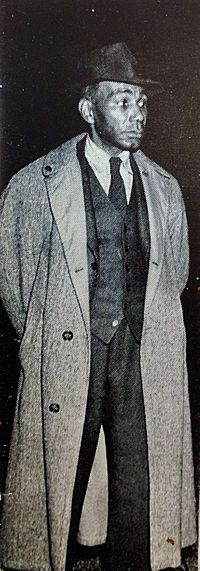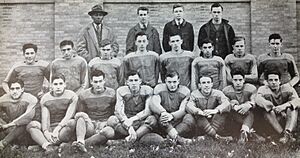Henry McDonald (American football) facts for kids
 |
|
| Born: | August 31, 1890 Port-au-Prince, Haiti |
|---|---|
| Died: | June 12, 1976 (aged 85) |
| Career information | |
| Position(s) | Halfback |
| College | Canandaigua Academy |
| Career history | |
| As player | |
| 1911 | Oxford Pros |
| 1911–1917 | Rochester Jeffersons |
| 1917 | All-Syracuse |
Henry C. McDonald (born August 31, 1890 – died June 12, 1976) was a professional American football player. He played for the Rochester Jeffersons from 1911 to 1917. Henry was one of the most famous Black American football players before the National Football League (NFL) was created in 1920.
Contents
Henry McDonald's Early Life
Henry McDonald was born in Port-au-Prince, Haiti. His birth parents allowed him to be adopted by his father's boss, an American who imported coconuts and bananas. Henry later said his parents knew it was a great chance for him to grow up in the United States. He even saw his birth mother 55 years later when he visited Haiti with his own family.
Henry spent his early childhood in Canandaigua, New York. Later, his family moved to Rochester. There, he made history by becoming the first Black American to graduate from Rochester's East High School.
Playing Professional Football
Henry McDonald started his professional football career in 1911. He played for a team called the Oxford Pros. In his very first pro game, Henry played as a halfback against the Rochester Jeffersons.
The Jeffersons' owner and coach, Leo Lyons, was very impressed by Henry's speed. He quickly convinced Henry to join the Jeffersons. Henry's amazing speed earned him the nickname "Motorcycle McDonald." He once said he could run 100 yards in just 10.2 seconds! At that time, the world record for 100 yards was 10 seconds flat.
In 1911, McDonald officially began playing for the Rochester Jeffersons, who were part of the New York Pro Football League. Playing football professionally back then was tough for making enough money. Henry remembered that he never earned more than $15 for a single day of playing football. He often had to play two games to get that much money.
Because of this, Henry would sometimes play a morning game in Rochester for the Jeffersons. Then, he would take a trolley to Canandaigua and play for the town team in the afternoon! During the summer, he also played baseball to earn more money. Henry loved playing halfback because running backs were the star players and earned the most money. In the early 1900s, the football was soft and shaped like a watermelon. Teams would only throw a few passes each game, usually as a last choice.
A Difficult Moment on the Field
Henry McDonald remembered only one negative incident during his seven seasons of professional football. In 1917, Henry and the Jeffersons (who were playing as the "Syracuse 47th Infantry") traveled to Ohio. They were there to play against the Canton Bulldogs, a team led by the famous Jim Thorpe.
During the game, a player from Canton named Greasy Neale pushed Henry out of bounds. Henry, who was also a boxer, was ready to fight back. But then, Jim Thorpe stepped in. Thorpe told Neale, "We're here to play football." After that, Henry said he never had any more trouble with Neale or any other Canton player.
Henry McDonald's Baseball Career
Besides football, Henry also played baseball for seven years in the Negro leagues. He played for teams like the Cuban Giants and the Pittsburgh Colored Stars.
Henry McDonald's Legacy
Henry McDonald left a lasting impact in sports. In 1990, he was part of the first group of people inducted into the Geneva (New York) Sports Hall of Fame. He was also a founding member of the Black Athlete's Hall of Fame, alongside famous athletes like Willie Mays, Jackie Robinson, and Jim Brown.
In 1937, Henry became the head football coach at DeSales High School. This made him the first Black American to be a head high school football coach in New York State. He coached at DeSales until 1943.
Henry was also one of the first umpires when Little League baseball was first started. Today, Geneva's Little League Park is named in his honor.
 | Shirley Ann Jackson |
 | Garett Morgan |
 | J. Ernest Wilkins Jr. |
 | Elijah McCoy |


